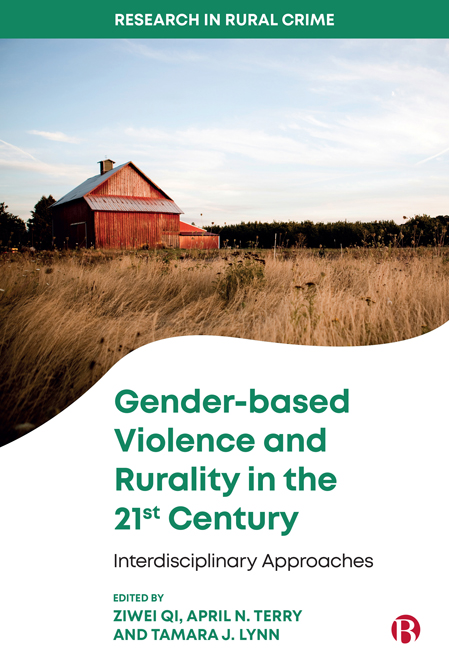Book contents
- Frontmatter
- Contents
- Series Preface
- List of Figures and Table
- List of Abbreviations
- Glossary
- Notes on Contributors
- Foreword
- 1 Understanding Rurality and Gender-based Violence
- PART I Rurality and Gender-based Violence
- PART II Beyond the Rural/Urban Divide: Critical Issues in Gender-based Violence
- PART III Access to Rural Justice: Economic Consequences and Policy Implications
- Index
10 - The Needs of Intimate Partner Violence Victims in Rural America
Published online by Cambridge University Press: 20 January 2024
- Frontmatter
- Contents
- Series Preface
- List of Figures and Table
- List of Abbreviations
- Glossary
- Notes on Contributors
- Foreword
- 1 Understanding Rurality and Gender-based Violence
- PART I Rurality and Gender-based Violence
- PART II Beyond the Rural/Urban Divide: Critical Issues in Gender-based Violence
- PART III Access to Rural Justice: Economic Consequences and Policy Implications
- Index
Summary
Introduction
Understanding intimate partner violence (IPV) among victims in rural areas is challenging as underreporting is more pronounced and barriers to service make victims more difficult to reach. These barriers may include, but are not limited to, culturally constructed gender roles, stigmas associated with abuse, poverty, fear of retaliation, a lack of access to housing and employment services, and lack of family support (DuBois et al, 2019).
Given the prevalence and harms of IPV, communities must respond amply and appropriately with a culturally sensitive and trauma-informed approach to meet victims’ needs. Community-based organisations and domestic violence service practitioners provide key services to victims such as housing, medical and legal support. These services, however, are not as readily available to victims who reside in rural or isolated areas. Given the difficulties rural IPV victims commonly encounter, the need to better measure and understand the magnitude and manners of harms becomes more urgent.
The findings presented here provide critical knowledge to the field regarding harms, challenges, access to justice and effective approaches to addressing IPV in rural communities. The authors first explore prevalence, barriers and the economic and emotional costs of IPV. Qualitative and quantitative data revealing both the short-term and long-term costs of family violence, limited access to rural justice, and effective policies to reduce IPV are needed.
The authors aim to extend the literature on the costs of IPV victimisation and service needs in rural communities and provide practical policy recommendations to service providers. While the specific examples presented here are derived from rural Kansas, these areas share many of the same characteristics as rural areas nationally and internationally and therefore offer a guide to improving the availability of services and reducing harm to disparate victims experiencing similar challenges. Even though place and crime vary in many ways (such as local sociocultural, economic and political climate) and they are deemed to be unique (Donnermeyer, 2007), we provide a vivid picture to help readers understand the rural reality and variability, as well as similarities when it comes to access to justice elsewhere. We also provide some topical and methodological discussions on how to conduct research in such areas, as well as guide future studies and policy recommendations to reduce barriers to accessing justice in the United States and internationally.
- Type
- Chapter
- Information
- Gender-based Violence and Rurality in the Twenty-first CenturyInterdisciplinary Approaches, pp. 145 - 167Publisher: Bristol University PressPrint publication year: 2023

